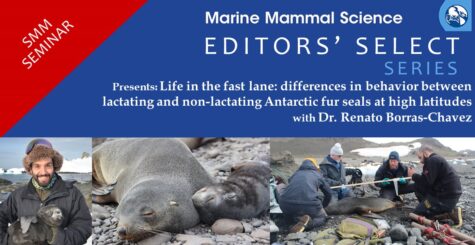
This series highlights the latest and most exciting marine mammal science published in the Marine Mammal Science Journal. The SMM created this series to give scientists and citizens around the world a chance to engage with marine mammal scientists, learn, and ask questions. All are welcome!
Join us on Thursday, 17 November 2022 at 6 PM GMT (10 AM PST / 1 PM EST)
for the next SMM Seminar Editors’ Select Series
Life in the fast lane: differences in behavior between lactating and non-lactating Antarctic fur seals at high latitudes
with Dr. Renato Borras-Chavez
This event is free to attend and presented online via Zoom, but registration is required.
Register here: https://us06web.zoom.us/webinar/register/WN_VJY7H6WBQA-aa4fNaV6Nvw
Space on Zoom is limited to the first 500 attendees. The talk will also be streamed live on the SMM Facebook page.
About the talk:
Mammals spend more energy when lactating (i.e., feeding their young) than at any other time in their lives. Antarctic fur seal mothers perform trips to sea to find food and then return to feed their pups, repeating this cycle for four consecutive months. By comparing at-sea behavior between lactating and non-lactating females carrying microprocessor instruments, we better understand the challenges of being a mother: they take shorter trips to get food (to return to their pups as quickly as possible), spend less time ashore (to start the cycle again as soon as possible), and modify their diving behavior to collect more food. Now that is a GREAT mom!
About the presenter:
Dr. Renato Borras-Chavez is a scientist from Chile. He obtained his bachelor’s degree in Marine Biology at Andres Bello University, Chile, and his master’s degree at San Diego State University, USA, working in kelp forest ecology. He started working with marine mammals while pursuing his Ph.D. at the Pontifical Catholic University of Chile. Since his first trip to Antarctica 10 years ago, he has been there seven times, including three long deployments for the project he is presenting here. After completing his Ph.D., he worked for three years with the Chilean Antarctic Institute (INACH), continuing his work on Antarctic pinnipeds. Today, he is a research associate at the Center of Applied Ecology and Sustainability (CAPES) and preparing to start a postdoctoral research project on leopard seal ecology at Baylor University. He was also the president and national representative of APECS Chile (the Association of Polar Early Career Scientists) until this year.
Open access to this article is made temporarily available in the weeks around the presentation and can be found here. Current SMM members have access to all Marine Mammal Science papers.
Missed a presentation or want to share this series with a friend? All previous Editors’ Select presentations are recorded and archived on our YouTube channel here: https://www.youtube.com/playlist?list=PLUc78IynQlubS2DVS1VZoplf_t42-yZOO